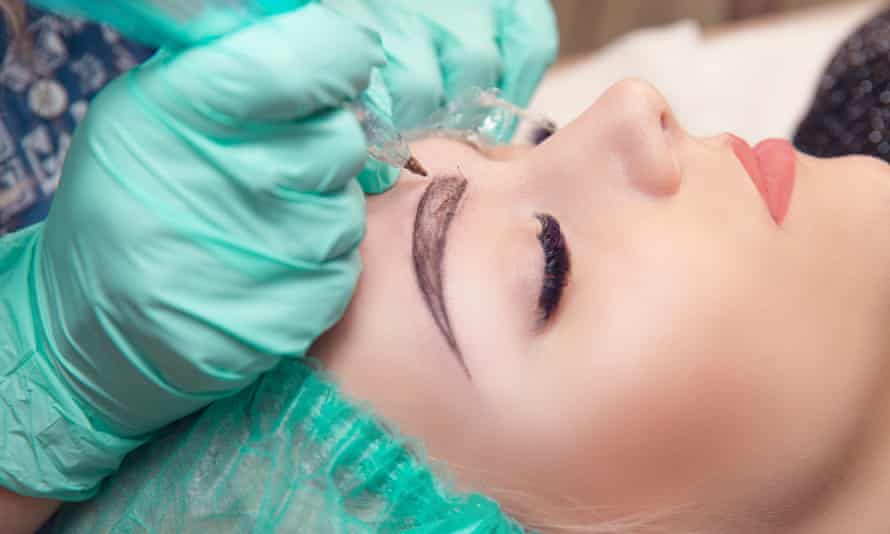
Images and Article from www.theguardian.com.
There has been a big rise in untrained, unscrupulous and untraceable “ghosts” making thousands of pounds a month administering Botox or fillers in people’s homes and abandoning clients when things go wrong, a campaign group has said.
The issue is a critical one, an expert has said, which the government has failed to address in its proposed new legislation to introduce a licence for non-surgical cosmetic procedures.
“We’re very disappointed that the government has ignored the evidence we gave them about these ‘ghosts’ and the serious and permanent damage they do to their clients,” said Ashton Collins, director of Save Face, a national, government-approved register of accredited non-surgical treatment practitioners.
During lockdown, said Collins, there was a dramatic rise in adverts for “at home” cosmetic procedures on social media. The only contact clients have with these practitioners is their social media account and a mobile number.
“These laypeople have literally no idea what they’re doing: at best, they might have watched a few videos on YouTube,” said Collins, who submitted evidence to the Department for Health and Social Care (DHSC) on what should be in the new legislation.
“After a couple of days, when things start to go wrong and the client needs their help, they disappear, shutting down their social media accounts and disposing of their untraceable pay-as-you-go phone,” she said.
“They disappear, leaving clients, who have quite often suffered serious and permanent harm at their hands, to desperately seek help from someone who might be just as unscrupulous,” said Collins.
“They, of course, simply open a new social media account and get a new mobile phone – then go on to target further clients. They have no fear of being caught, because they can’t be.”
Sajid Javid, the health secretary, has said that people administering Botox or fillers will be required to have a licence under new laws after an “unacceptable” rise in reports of botched cosmetic procedures in the UK. “Far too many people have been left emotionally and physically scarred” when things have gone wrong, he said.
The legislation to protect against rogue practitioners will make it an offence to perform such non-surgical work without a licence. It will aim to bring in consistent standards that people carrying out non-surgical cosmetic procedures must meet, as well as setting out hygiene and safety standards for premises.
In the Commons on Tuesday, Laura Trott, Conservative MP for Sevenoaks, asked Javid how the “proposed licensing machine will keep pace with the rapidly changing landscape of these treatments?”
Javid said the “details of the regime will be set out in regulations, meaning it will be flexible, it will be agile and it will change in response to changes in the cosmetics industry”.
Minister for patient safety Maria Caulfield said the amendment is the “next step on the road to effective regulation of non-surgical cosmetic procedures in England”.
She added: “The spread of images on social media has contributed to an increase in demand for cosmetic procedures such as Botox and fillers.
“While these can be administered safely, we are seeing an unacceptable rise in people being left physically and mentally scarred from poorly performed procedures.”
The all-party parliamentary group on beauty, aesthetics and wellbeing carried out a year-long investigation into the industry.
Carolyn Harris, the group’s co-chair, said: “We found that the regulation of cosmetic treatments remains fragmented, obscure and out of date, meaning anyone can carry out any treatment, anywhere, with next to no restrictions on what qualifications they must have to do so.
“This has left consumers at risk and undermined the industry’s ability to develop.”
Harris welcomed the proposed new legislation but added: “A licensing framework set in law is an important step in the right direction, however this must be underpinned by mandated national minimum standards for practitioner training.”
Save Face has seen complaints increase from 378 in 2017 to 2,083 in 2020. In one of the most serious cases, a woman said she had such severe wounds from treatment that she contracted sepsis and ended up in hospital in a coma for five days.
But the number of complaints was likely to be the “tip of the iceberg”, said Collins: “There are lots of severe medical side-effects that come along with these treatments – but because they’re classed as beauty treatments, anybody can do them.”
Of the treatments complained about, 86% were carried out by beauticians, hairdressers or laypeople, with 81% of complainants finding their practitioner on social media.
Clients were often unaware of the risks, said Collins: 93% were not warned about serious complications and thought the treatments were low-risk beauty treatments; 83% did not give informed consent’; and 84% were ignored or blocked by their practitioner when they tried to seek help.
Article shared from www.theguardian.com



